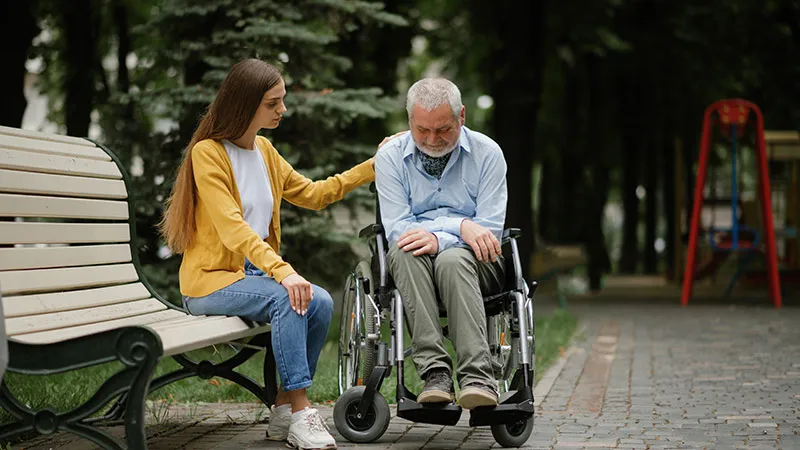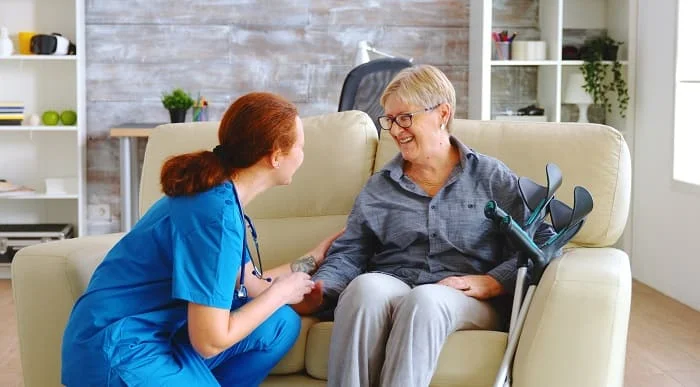Health and Social Care
What is confidentiality in health and social care – How ensure it
It’s critical to understand your responsibility of confidentiality if you work in health and social care. Everybody deserves their privacy, and we have to ensure nobody violates it. It’s a fundamental right of people regardless of where they are. You must uphold this obligation and ensure that those who are under your care have their legal rights to privacy properly respected.
Confidentiality in health and social care is even more critical, considering people often have to disclose personal information in good faith here. Always protect this information given to you unless it’s an exceptional case, like if the person is in immediate danger.
Even the government has clear regulations regarding our privacy. We’ll talk in detail regarding all of these and more. Keep reading; we have compiled all the valuable information regarding confidentiality here.
Table of Content
- What is Confidentiality?
- What is Confidentiality in Health and Social Care?
- Maintaining Confidentiality in Health and Social Care
- UK Legislation Regarding Confidentiality in Health and Social Care
- The Duty to Share Information
- Five Rules of Confidentiality in Health and Social Care
- When Can You Break Confidentiality in Health and Social Care?
- Conclusion
- What to Read Next:
What is Confidentiality?
Confidentiality entails two things-
- Respecting one’s privacy
- Respecting someone’s wishes
If you have someone’s private information, it means that they shared it with you in good faith. It is your duty, as well as their right, that this information will be well protected. You cannot, under any circumstance, share this information unless the person gives you the permission to do so.
What is Confidentiality in Health and Social Care?
Professionals, especially those in health and social care, are no exception. The same logic applies to them as well. It doesn’t matter who you are; whether you’re a:
- Doctor
- Nurse
- Social worker
- Support worker
- Psychologist, Counsellor or Therapist, confidentiality is an obligation regardless.
Confidentiality in health and social care is critical because it allows patients and clients to feel comfortable sharing information. It also ensures that they receive the best treatment they require. Medical experts and care providers must maintain anonymity in order to carry out their crucial duties.
Confidentiality also means that the practitioner should maintain a level of trust with the patient as part of good care practice.
This means that the practitioner should only tell those who need to know about what a patient has said and their personal information. This includes not showing an individual’s personal notes or computer information to anyone apart from those who need to know.
Check out our other blog, “Safeguarding in health and social care assignment – free download.”
Maintaining Confidentiality in Health and Social Care
In medical and social care settings, maintaining confidentiality can entail simple practical steps like placing computer screens in such a manner so that information isn’t accidentally seen by third parties. It also entails adhering to official rules in sensitive and complex situations.
Confidentiality is a legal and professional responsibility for those working in the health and social care sectors, and they will be required to receive extensive training on the subject.
Maintaining confidentiality on a daily basis entails:
- Making sure that private conversations about sensitive topics are only held in private locations.
- Only necessary and relevant data is recorded and accessed.
- Keeping this recorded data private and locked away properly. If the data is digital, then keeping it protected from hackers and scammers.
- Immediate notification of any potential data breaches.

Depression Awareness Training Course Online
- Accredited Courses
- Tutor Support Included
- 3 Installment Plan at checkout
- 14 Days Money Back Guarantee
UK Legislation Regarding Confidentiality in Health and Social Care
Before we move on, we’re going to address the question, “what legislation relates to confidentiality in health and social care?”
There are a couple of pieces of legislation in the UK concerning confidentiality. But the following five are the main ones.
- Human Rights Act 1998
- Care Act 2014
- Health and Social Care (Safety and Quality) Act 2015
- General Data Protection Regulation (EU) 2016/679
- Data Protection Act 2018
The Human Rights Act gives every individual the right to their privacy and confidentiality in health and social care. This includes maintaining the confidentiality of any personal information. The Care Act 2014 urges caregivers to take a person-centred approach and emphasises sharing information early on in the process of care to keep individuals safe.
The Health and Social Care (Safety and Quality) Act 2015 is concerned with the integration of data about users of health and social services. The General Data Protection Regulation (EU) 2016/679 and The Data Protection Act 2018 contain provisions that describe how various organisations must manage personal data.
You can check our other blog, “15 Ways of Supporting Individuals with Awareness of Personal Safety.”
As you might have guessed by now that there are circumstances where sharing information is necessary. The duty of sharing information is just as important as protecting it. We’ll talk about it in the next section. But first, let’s look at The HSCIC Guide to Confidentiality 2013.
It essentially explains what health and care workers should do and why in order to communicate information safely while adhering to confidentiality rules. It encompasses the following five rules of confidentiality:
Five Rules of Confidentiality in Health and Social Care
Handling of Information |
Treat any information concerning service users or patients with respect and confidentiality. |
Breaking Confidentiality |
When it is necessary for the safe and effective care of an individual, members of a care team should disclose confidential information. But a care team should follow this procedure only when it is absolutely vital for the client’s safety and well-being. |
Anonymizing Information |
Anonymize information that is shared for the benefit of the community. |
Any Objection to the Sharing of Personal Information |
Honour the right of an individual to object to the sharing of personal information. |
Organisation’s Responsibility |
It is the duty of organisations to implement policies, processes, and systems that guarantee that confidentiality standards are respected. |
All these guidelines are clear. However, the second rule of confidentiality states that care workers can break confidentiality if it is necessary.
What do we mean by that?
It’s an important discussion and so that’s what we’re going to talk about in the next section.
Top Courses of this Category
When Can You Break Confidentiality in Health and Social Care?
It’ll be best if we break down the discussion in terms of practical examples rather than taking a theoretical approach.
Scenario One
Imagine a scenario where a patient or a client is under your care.
They shared confidential information with you in good faith that you’ll respect their privacy. But after you analyse this information, you somehow realise that other people are looking for ways to take gross financial advantage of your client.
What do you do here? You can,
a. Remain silent, thinking it’s not really your concern as the client themselves isn’t doing anything about it despite knowing the danger.
b. Help the client by addressing the specific weakness that puts the client at the risk of harm.
Scenario Two
Imagine another scenario where you are a counsellor.
A person is taking your care. After a few sessions with the client, you realise that they are really not interested in your care. They are rather trying to deceive you by producing medical documents that will help them take advantage of their family members.
Apply the same logic here. Do you,
a. Remain silent and let the client seek someone else’s care as their behaviour is disturbing?
b. Stick with the client to expose their ill will and ensure the safety of their family members?
Notice that in both these scenarios, the client’s side of the story isn’t present. This is deliberate. We don’t want you to be influenced by the client in any shape or form. Take a minute and think about these two scenarios from your own unbiased thought process and consider what approach you want to take and why.
If you’re done, now let’s take a look at another scenario.
Scenario Three
Say you’re a care worker who is giving care to a person in their home.
While helping them take a shower, you notice a series of deep cuts and bruises around their private body parts. You immediately realise that the person has been either physically or sexually assaulted. When you asked the person how they got hurt, they are trying to shove it off as an accident.
But upon careful inspection, you conclude that these injuries are no mere accidents. You decide to investigate. You treat them with kindness and a genuine concern for their well-being.
After a while, you gain the client’s confidence, and they disclose to you that they have been periodically sexually assaulted by a distant family member. But their family is extremely reserved. The victim thinks that any attempt to help them will disrupt the whole family and it will bring shame upon them.
But, when you try to explain to the client that they are in grave danger, they firmly refuse. However, if this goes on, it’s really anybody’s guess what will happen to the victim in future.
Nobody will want the person to suffer. But since they’re strongly disapproving of anything that needs to be done, what does one do?
All these are scenarios that you’ll encounter if you work in health and social care. In these cases, it is acceptable to break your vow of confidentiality.
Consider the following:
- Is the person under your care at any risk of harm?
- Does the person under your care intend to harm someone?
As a care worker, it is YOUR DUTY to protect people. We have to understand that people sometimes make emotional decisions that they may later end up regretting. So it’s your duty and a demand from good conscience to ensure that the situation doesn’t get any worse than it already is.
And don’t worry. You’re acting within the common law here. Public Interest Disclosure Act 1998 protects you as well as anyone concerned from any unwanted situation if you work in the best interest of the victim.
Conclusion
Confidentiality in health and social care is a responsibility. You have to maintain it. However, suppose a patient or client is in danger or poses a risk to others. In that case, you may be able to ignore this responsibility in specific instances if it is in their best interests or the public’s best interests.
FAQs
Why is confidentiality important in health and social care settings?
Confidentiality in health and social care is critical because it allows patients and clients to feel comfortable sharing information, which is crucial in ensuring they receive the treatment they require.
What is confidentiality in nursing?
Confidentiality in nursing is the same as confidentiality in health and social care. Nursing is a role in health and social care services, and as such, they have the same duties as any other professional in this sector.
How does the Health and Social Care Act 2012 relate to confidentiality?
The Health and Social Care Information Centre can now exchange confidential information in medical records for purposes such as service development and commissioning, thanks to the Health and Social Care Act 2012.
How do you explain confidentiality to a client in social work?
The idea and practice of keeping sensitive information private unless the owner or custodian of the data gives specific approval for it to be shared with another party is known as confidentiality. The social worker’s commitment to keep client information confidential is backed up by state law.
What are the benefits of confidentiality in health and social care?
Patients provide private and confidential information to doctors so that they can be treated and counselled effectively; if confidentiality is violated, patients will be unwilling to share information, and treatment may suffer as a result.
However, confidentiality policies and procedures in health and social care also follow rationalism. Healthcare professionals can break confidentiality provided that there were sufficient reasoning for doing so.
What to Read Next:
- Can Social Services Force Someone Into a Care Home
- What is the Most Enjoyable Part of Care Work
- What are the Caldicott Principles? Principles of Caldicott
- What is the Main Principle of the Care Act 2014
- Child Development Theorists Cheat Sheet – Everything you Need to Know
- How to Become a Mental Health Support Worker?
- How to become a Social Worker – A Complete Guide









